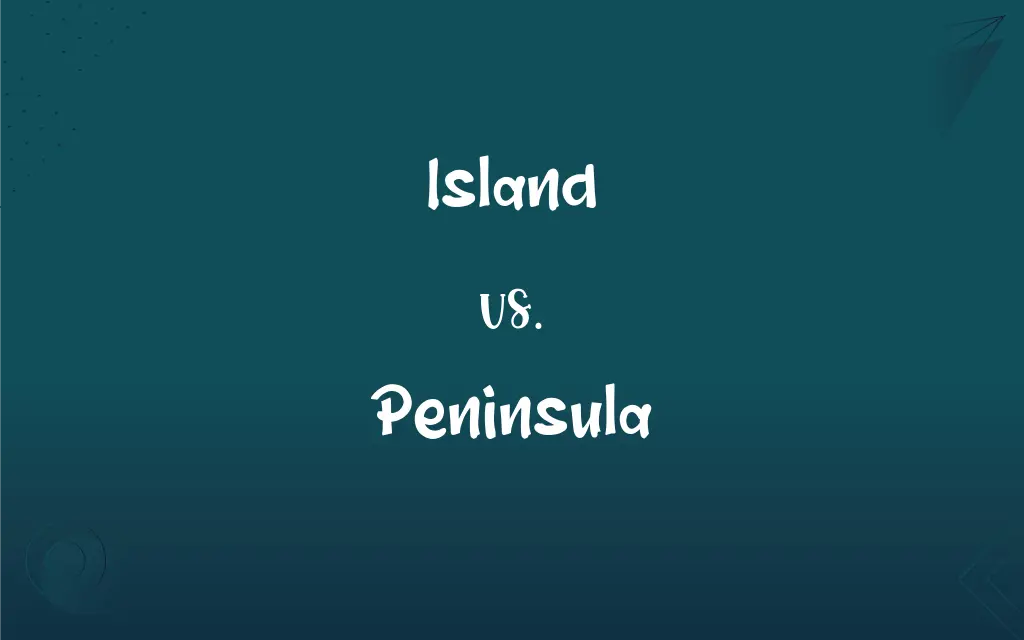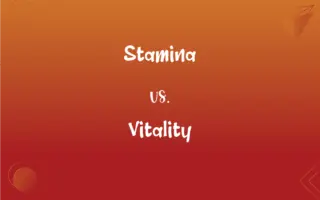Island vs. Peninsula: What's the Difference?
Edited by Aimie Carlson || By Janet White || Published on October 23, 2023
Island is a landmass surrounded by water; Peninsula is a landmass surrounded by water on three sides.

Key Differences
Islands are landmasses that are entirely surrounded by water, distinct from the mainland. Peninsulas, on the other hand, are extensions of land jutting out into a body of water, but remain connected to the mainland on one side. These geographic features can be large or small, but the defining characteristic of an island is its complete isolation by water. Conversely, a peninsula is identified by its partial enclosure by water, with a connection to a larger landmass.
Islands can be found in oceans, seas, rivers, and even lakes. Their formation can be due to volcanic activities, sediment deposition, or other geological events. Peninsulas arise from various processes too, such as erosion or changes in sea levels, but they maintain a connection to a larger landmass. Both features influence local climate, biodiversity, and human settlements.
Historically, islands have often been seen as remote and secluded places, offering unique habitats for flora and fauna. Peninsulas, given their accessibility to larger land areas, often become strategic locations for ports, cities, and trade. Both have played crucial roles in human history, exploration, and culture.
Though islands and peninsulas share some similarities due to their proximity to water, their primary distinction lies in their connectivity. Islands stand alone, while peninsulas reach out yet remain anchored to a greater expanse of land.
Comparison Chart
Definition
Land surrounded by water on all sides.
Land surrounded by water on three sides.
ADVERTISEMENT
Connectivity
Isolated from the mainland.
Connected to the mainland.
Formation
Volcanic activity, sediment deposition.
Erosion, sea level changes.
Accessibility
Often requires boats or planes.
Accessible by land.
Strategic Value
Seclusion, unique habitats.
Trade, ports, strategic locations.
Island and Peninsula Definitions
Island
A piece of land surrounded by water.
Hawaii is a group of islands in the Pacific Ocean.
ADVERTISEMENT
Peninsula
A piece of land projecting into water from a larger landmass.
The Florida peninsula extends into the Gulf of Mexico and the Atlantic Ocean.
Island
A traffic safety zone in a street or intersection.
The pedestrian waited at the island before crossing.
Peninsula
A strategic point in terms of commerce and defense.
The Italian Peninsula was central to Roman trade routes.
Island
A kitchen counter not attached to walls or other counters.
They prepared dinner on the kitchen island.
Peninsula
A land extension that's distinct from the mainland.
The Korean Peninsula has a rich history.
Island
Abbr. Isl. or Is. or I. A landmass, especially one smaller than a continent, entirely surrounded by water.
Peninsula
An elongated mass of land stretching into a body of water.
The Baja California Peninsula is known for its unique ecosystems.
Island
An unattached kitchen counter providing easy access from all sides.
Peninsula
Land bordered by water on three sides.
The Iberian Peninsula includes Spain and Portugal.
Island
A raised curbed area, often used to delineate rows of parking spaces or lanes of traffic.
Peninsula
A piece of land that juts out from a larger land mass and is mostly surrounded by water.
Island
The superstructure of a ship, especially an aircraft carrier.
Peninsula
(geography) A piece of land projecting into water from a larger land mass.
Island
(Anatomy) A cluster of cells differing in structure or function from the cells constituting the surrounding tissue.
Peninsula
A portion of land nearly surrounded by water, and connected with a larger body by a neck, or isthmus.
Island
To make into or as if into an island; insulate
A secluded mansion, islanded by shrubbery and fences.
Peninsula
A large mass of land projecting into a body of water
Island
A contiguous area of land, smaller than a continent, totally surrounded by water.
Island
(by extension, in place names) A contiguous area of land, smaller than a continent, partially surrounded by water; A peninsula; A half-island.
Despite its name, Barry Island is actually a peninsula
Island
An entity surrounded by other entities that are very different from itself.
An island of colors on a butterfly's wing
Island
A superstructure on an aircraft carrier's deck.
Island
A traffic island.
The island in the middle of a roundabout
Island
(by extension, West Midlands dialect) A roundabout; A traffic circle.
Dunton island, near Birmingham, is one of the most confusingly labelled islands in the U.K.
In Coventry, you will often hear people say: “Turn right at the island”.
Island
A bench, counter, etc., that is not connected to a wall or other furniture and which can be used from any side.
Island
(government) An unincorporated area wholly surrounded by one or more incorporated areas.
Island
(grammar) A phrase from which a wh-word cannot be extracted without yielding invalid grammar.
Island
(transitive) To surround with water; make into an island.
Island
(transitive) To set, dot (as if) with islands.
Island
(transitive) To isolate.
Island
A tract of land surrounded by water, and smaller than a continent. Cf. Continent.
Island
Anything regarded as resembling an island; as, an island of ice.
Island
To cause to become or to resemble an island; to make an island or islands of; to isle.
Island
To furnish with an island or with islands; as, to island the deep.
Island
A land mass (smaller than a continent) that is surrounded by water
Island
A zone or area resembling an island
Island
A landform smaller than a continent and entirely surrounded by water.
Ellis Island was a gateway for immigrants.
Island
An isolated community or area.
The city park is an island of green amidst the urban sprawl.
FAQs
What is an island?
An island is a landmass surrounded entirely by water.
How are peninsulas formed?
Peninsulas can form from erosion, sea level changes, or other geological processes.
Are all islands found in oceans?
No, islands can be in oceans, seas, rivers, and lakes.
Do people live on most islands?
While many islands are inhabited, countless others are not.
Can a peninsula be found inside a lake?
Yes, as long as it's surrounded by water on three sides and connected to land.
What's the largest island in the world?
Greenland is the world's largest island.
Are islands always natural formations?
Mostly, but there are also man-made islands constructed for various purposes.
Why are peninsulas strategically important?
Their access to both land and sea makes them valuable for trade, defense, and transport.
Is every piece of land in a river considered an island?
If completely surrounded by water and not connected to either riverbank, it is an island.
Can an island become a peninsula or vice versa?
Yes, due to geological changes or rising/falling sea levels, islands can get connected, or peninsulas can get isolated.
What distinguishes a peninsula?
A peninsula is land surrounded by water on three sides but remains connected to the mainland.
Which is typically larger, an island or a peninsula?
There's no rule; both can range from small to large.
How does the presence of islands influence ocean currents?
Islands can redirect, split, or block ocean currents, affecting marine ecosystems and climate.
Are peninsulas prone to natural disasters?
Their exposure to water on multiple sides can make them susceptible to storms, floods, and tsunamis.
How does human activity affect peninsulas?
Urbanization, deforestation, and pollution can alter peninsula ecosystems and shorelines.
What's the difference between an island and an islet?
An islet is much smaller than an island and often uninhabitable.
Why are peninsulas considered important in history?
Their strategic locations have made them focal points for exploration, trade, and conflicts.
Can an island be created artificially?
Yes, there are many man-made islands built for housing, recreation, and other purposes.
Why are some islands tourist attractions?
Many islands offer unique beauty, biodiversity, and recreational opportunities.
Can a peninsula have its own distinct climate?
Yes, proximity to water can moderate temperatures and influence weather patterns on a peninsula.
About Author
Written by
Janet WhiteJanet White has been an esteemed writer and blogger for Difference Wiki. Holding a Master's degree in Science and Medical Journalism from the prestigious Boston University, she has consistently demonstrated her expertise and passion for her field. When she's not immersed in her work, Janet relishes her time exercising, delving into a good book, and cherishing moments with friends and family.
Edited by
Aimie CarlsonAimie Carlson, holding a master's degree in English literature, is a fervent English language enthusiast. She lends her writing talents to Difference Wiki, a prominent website that specializes in comparisons, offering readers insightful analyses that both captivate and inform.





































































